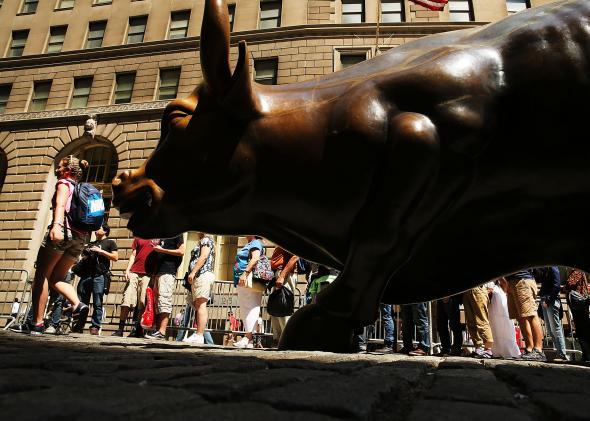A few weeks ago, Out on the Street—a kind of Human Rights Campaign for the financial industry—hosted a panel of Wall Street executives and their openly gay sons. John Mack, the formidable former CEO of Morgan Stanley, admitted that his youthful homophobia was sometimes “downright cruel” and described his gay son as “at every level, the son I wanted.” Paul Singer, CEO of Elliott Management Corp., rued the “fear and nervousness” he felt about his son’s sexuality; he ultimately launched a PAC to back pro-gay Republicans. Dan O’Connell, CEO of Vestar Capital Partners, apologized to his son for being “ambivalent” and “insensitive” about gay rights but noted that he’s since become a staunch advocate.
Unmoved by these heartfelt mea culpas? Consider this article from New York magazine’s archives chronicling the lives of gays on Wall Street. Bankers suspected of being gay are called “faggots” in disgust; one new banker has the word written on his office wall in Magic Marker. Virtually all gay bankers are completely closeted and employ their opposite-sex friends as faux-partners to mask their sexuality. Those who are outed are often demoted—“the firm wanted to uphold a family-values image,” one is told—or simply fired. Anti-gay jokes run rampant around the office. Describing the environment, one gay banker admits, “They buy your dignity.” The article reads like a dark satire of 1950s anti-gay office culture. It was published in 1999.
In the intervening 15 years, everything has changed. Every major Wall Street firm has strictly enforced non-discrimination policies. Many celebrate Pride Month and Spirit Day and host special events for LGBTQ staffers. Employees frequently voice their support for marriage equality and proudly display pro-equality stickers. One former Goldman Sachs analyst told me that the firm held regular town halls and special networking sessions for gay staffers, as well as trainings for straight employees in “how to be an ally in the workplace.” The office was filled with openly gay people, including many in senior positions.
“There are few work environments that I could imagine as welcoming as Goldman Sachs” for gay people, the analyst told me. “There is no rainbow glass ceiling.”
How has progress come so quickly to a sector that was, just 15 years ago, still mired in vicious homophobia? The first reason is pure ubiquity: Although gays in finance haven’t always been out, they have always been plentiful. My Goldman source suggested that the “Best Little Boy in the World” hypothesis explains the pervasiveness of LGBTQ people on Wall Street; “money and status,” he added “is a way to escape discrimination to some extent, as well.” As the marriage equality movement gained steam throughout the aughts, an increasing number of Wall Street gays refused to remain in the closet; their sheer numbers were enough to topple many barriers to progress. Besides, once a few firms started marketing their gay-friendly atmosphere as a perk, LGBTQ tolerance became a wedge issue in the fiercely competitive realm of Wall Street recruitment.
But the broader cultural shift among major firms toward outspoken support of LGBTQ equality seems to have come largely from the top. CEOs who once tossed out anti-gay epithets on the trading floor—or, worse, fired openly gay employees on account of their sexuality—are now bragging about their multi-million-dollar donations to pro-gay causes. Wall Street moguls played a vital role in the coalition to bring marriage equality to New York, spending millions to guide the legislation through a Republican state senate and onto Gov. Andrew Cuomo’s desk.
For a number of these CEOs, like Mack, Singer, and O’Connell, this speedy and passionate reversal can be explained by the Portman effect: Rich people don’t have poor kids, but they can have gay kids, and when they do, they tend to become advocates for equality with remarkable celerity. For others, like Goldman CEO Lloyd Blankfein, implementing pro-gay policies is just the right thing to do: It’s both good morality and good business. That’s how my Goldman source put it when I asked him whether his former employer was guilty of pinkwashing: “It’s a mixture of self-interest and legitimate altruism.”
Most reporting on Wall Street’s eye-popping pro-gay philanthropy contains a brief but fascinating caveat: Many Wall Street CEOs vote Republican, and some are major GOP donors whose money inevitably winds up supporting vehemently anti-gay candidates. A number of major Wall Street players have attempted to square this circle by pushing Republicans toward marriage equality. But the GOP of 2014 is so brimming with anti-gay animus that some CEOs have openly expressed their displeasure with Republicans’ continued resistance to equality.
For now, most of these pro-gay CEOs remain willing to support Republicans’ fiscal policies and overlook their reactionary social platforms. It’s unclear, however, how long this stalemate can last. Those Wall Street executives who do pour money into the GOP have largely refrained from using their donations as leverage to influence the party’s social policies. For a CEO with only a passing interest in marriage equality, gay rights may remain an expendable issue. But for those CEOs who loudly trumpet the moral and financial necessity of LGBTQ equality, the GOP’s resistance to progress may soon translate into withheld donations.
At that point, Republican leaders will have a stark choice: Cleave to their anti-gay convictions and watch their campaign contributions shrivel—or evolve and continue to win elections. In American politics, money often dictates ideology. Wall Street holds the money Republicans need to stay in office. Its CEOs are accustomed to paying the piper; don’t be surprised when they start to call the tune.
